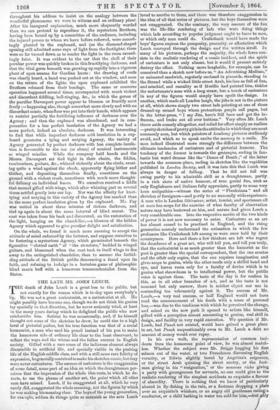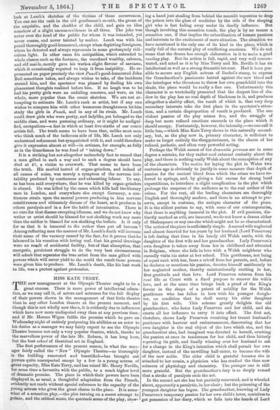THE LATE MR. JOHN LEECH.
THE death of John Leech is a great loss to the public, but not exactly for the reason which is to-day upon everybody's lip. He was not a great caricaturist, or a caricaturist at all. He might possibly have become one, though we do not think his genius lay specially in that direction, but he never seriously tried, at least in the many years during which he delighted the public who now misdescribe him. Satirist he was occasionally, and, if he himself thought out some of the sketches he drew, he could rise to a high level of pictorial pathos, but his true function was that of a social humourist, a man who used his pencil instead of his pen to make the humorous aide of ordinary life clear to the least observant, to reflect the ways and the whims and the follies current in English society. Gifted with a rare sense of the ludicrous element always discernible in artificial life, and specially visible in the pushing life of the English middle class, and with a still more rare felicity of expression, he generally contrived to make his sketches comic, but they were never caricatures. The essence of caricature is the exaggeration of some detail, some part of an idea on which the draughtsman per- ceives that the impression of the whole idea rests, in which he de- tects, to use the phrase of another art, the point which all other men have missed. Leeoh, if he exaggerated at all, which he very rarely did, exaggerated the whole meaning, not the figures by which he was making his meaning clear. The boys of the young generation, for example, seldom do things quite so mannish as the acts Leech
loved to ascribe to them, and there was therefore exaggeration in the idea of all that series of pictures, but the boys themselves were not exaggerated. On the contrary, the very essence of the fun was the life-like rendering of lads who were doing things which lads according to popular judgment ought to leave to men,
or which only men could do. Cruikshank would have made the boys' figures express the pomposity, precocity, or affectation which Leech conveyed through the design and the written scroll. In many of his pictures, perhaps the majority, the whole force con- sists in the realistic rendering of a comic incident, and the spirit of caricature is not only absent, but it would if present entirely destroy the effect. Nothing more laughable, for example, can be conceived than a sketch now before us, " An Advertising Medium," or animated sandwich, regularly enclosed in placards, standing in the Strand while a wicked little street Arab, his face as full of fun, and mischief, and rascality as if Murillo had painted him, tickles the unfortunate's nose with a long straw, but a touch of caricature in any of the figures would simply have spoilt the design. In another, which made all London laugh, the joke is not in the picture at all, which shows simply two street lads pointing at one of those dressed-up errand boys whom pretentious people call pages, but in the letter-press, " I say Jim, here's Bill been and got the in- fluenza, and broke out all over buttons." Very often Mr. Leech threw aside comedy altogether, and relied for effect simply on realism —pretty sketches of pretty girls in the atti tudes in which they are most commonly seen, but which painters of Academy pictures studiously avoid, and which so to speak excite the memory to a smile. No man indeed illustrated more strongly the difference between the ultimate tendencies of caricature and of pictorial humour. The tendency of the former is towards the grotesque, ending in fan- tastic but weird dreams like the " Dance of Death ;" of the latter towards the common-place, ending in sketches like the vapidities published in London Society, and it was into this that Leech was always in danger of falling. That he did not fall was owing partly to his admirable skill as a draughtsman, partly to a rich store of native humour, of true genial fun, such as only Englishmen and Italians fully appreciate, partly to some very keen antipathies—witness the series of " Flunkeiana " and all sketches of foreigners—and p irtly to an unusually wide experience. A man who is London litarateur, artist, tourist, and sportsman all at once has scope for the exercise of what faculty of observation nature may have bestowed on him, and nature had given Leech a very considerable one. Into the respective merits of the two kinds of power it is not now necessary to enter. Caricature as an art has almost ceased to be practised in England, and the rising generation scarcely understand the estimation in which the few professors like Cruikshank left among us were once held by their countrymen. Here and there a few thinkers are left who regret the decadence of a great art, who will tell you, and tell you truly, that the caricaturist is as much greater than the humorist as the poet is greater than the special correspondent, that the one creates and the other only copies, that the one requires imagination and gives scope to genius, while the other needs only a skilful hand and eye, and leaves room only for a faculty of device which is to genius what shrewdness is to intellectual power, but the public voice is against them. The taste of the day is for realism in this, as in all other branches of art, and as the taste is not unsound but only narrow, there is neither object nor use in contending too vehemently against it. The success of Mr. Leech,—a very real success, or half England would not have read the announcement of his death with a sense of personal loss,—was due to the readiness with which he perceived the change, and seized on the new path it opened to artists like himself, gifted with a perception almost amounting to genius, real skill in design, and facility in very rapid execution. We question if Mr. Leech, had Punch not existed, would have gained a great place in art, but Punch unquestionably owes to Mr. Leech a debt no amount of money would ever repay.
In his own walk, the representation of common inci- dents from the humorous point of view, he was almost match- less. Whether the subject were Mr. Briggs hugging his first salmon out of the water, or two Frenchmen discussing English voracity, or Edwin slightly bored by Angelina's exigeance, or the street Arab quizzing the street sentry, or the foot- man giving in his " resignation," or the nouveau riche giving a party with greengrocers for servants, no one could give to the realistic rendering of the simplest accidents so exquisite a flavour of absurdity. There is nothing that we know of particularly absurd in fly-fishing in the rain, or a footman dropping a plate over an exquisite's whiskers, or an angry old gentleman rating,a conductor, or a child bathing in water too cold for him,—but ly look at Leech's sketches of the victims of those occurrences. ing a hand just stealing from behind the moonlit tapestries to drop You can see the oath in the old gentleman's mouth, the groan of the poison into the glees of medicine by the side of the sleeping the exquisite, and the shudder of the child, and gain an idea girl who is fast fading away under its deadly influence. But somehow of a slight unreasonableness in all three. The joke was though involving this sensation touch, the play is by no means a never over the head of the public for whom it was intended, yet sensation one, if that implies the subordination of human passions never coarse, and never tainted by malice. Leech was with his and interests to the excitement of more situation. The situation we pencil thoroughly good-humoured, except when depictiug foreigners, have mentioned is the only one of its kind in the piece, which is whom he detested and always represents in some grotesquely ridi- really full of the natural play of conflicting emotions. We do not culous light. In other cases his antipathies, which extended to mean that the drama has enough elaboration in it to make a good whole classes such as the footmen, the unrefined wealthy, cabmen, reading play. But its action is full, rapid, and very well concen- and old maids,.merely gave his work-a slight flavour of sarcasm, trated, and acted as it is by Miss Terry and Mr. Neville it has an which it occasionally required to keep it from insipidity. He re- intellectual as well as a strong dramatic interest. Had it been pas- presented on paper precisely the view Punch's good-humoured John Bible to secure any English actress of Rachel's stamp, to express Bull sometimes takes, and always wishes to take, of the incidents the Grandmother's passionate hatred against the new blood and around him, and the spectator was pleased by finding his own the interloper who threatens to throw her own grandchild into the pleasantest thoughts realized before him. If no laugh was to be shade, the piece would be really a fine one. Unfortunately this had his pretty girls were an unfailing resource, and were, on the character is so wretchedly presented that the deepest line of she- whole, more popular than the comic sketches. We are not at- dow in the play has no real depth of blackness in it, and produces tempting to estimate Mr. Leech's rank as artist, but if any one altogether a shabby effect, the result of which is, that very deep wishes to compare him with other humorous draughtsmen let him secondary interests take the first place in the spectator's atten- study the girls in Punch, and in any of its rivals. Mr. Leech tion, and a certain disproportion of result is produced. The one could draw girls who were pretty, and ladylike, yet belonged to the violent passion of the play misses fire, and the struggle of middle class, and were pursuing ordinary, or it might be undigni- deep but more refined emotions succeeds to the place which it fled, occupations—a feat in which at least five-sixths of our comic should occupy. Fortunately, however, the intensity,—we can call it artists fail. The truth seems to have been that, unlike most men little less,—which Miss Kate Terry shows in this naturally second- who think much of the ludicrous side of life, Mr. Leech not only ary, but, as the play now is, primary character, is sufficient to understood refinement but sympathized with it, and could therefore make us forget entirely the disappointment, in the charm of her give it expression almost at will—in artizans, for example, as fully refined, pathetic, and often very powerful acting.
as in the Guardsmen he was fond of " taking down." Perhaps the Welsh names of the dramatis persona are in some































 Previous page
Previous page